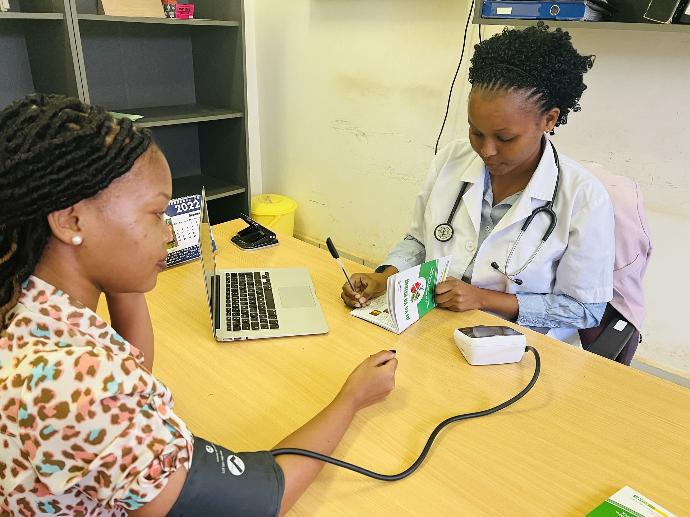
What is Hypertension?
Hypertension or High blood pressure is a condition where blood flows with a higher pressure than normal through blood vessels. Non-communicable diseases including hypertension have been rising globally, this is mostly caused by unhealthy lifestyle behaviors such as unhealthy diet, physical inactivity, tobacco smoking and harmful use of alcohol. The condition affects many people and if not properly managed, it may result in heart attack, stroke, kidney diseases, poor vision and sometimes blindness.
Understanding hypertension is a great starting point to help you in management or prevention of hypertension. Blood pressure is measured by a blood pressure machine and it is given in two numbers , a top number called systolic blood pressure and a bottom number called diastolic blood pressure. The systolic reading is the blood pressure inside arteries when the heart is contracting while the diastolic reading is the blood pressure inside arteries when the heart is resting between beats.
An example of a blood pressure reading is 120/80mmHg, where 120 mmHg is the systolic blood pressure and 80 mmHg is the diastolic blood pressure, mmHg is a measure of pressure.
What is the blood pressure of a healthy individual?
In general, the systolic blood pressure of less than 120 mmHg and diastolic blood pressure of 80mmHg (120/80mmHg) is considered an ideal blood pressure.
A blood pressure that is consistently 140/90mmHg or higher, measured on two different days, indicates potential for hypertension.
An elevated blood pressure is when the blood pressure consistently ranges between 120-129 systolic and less than 80 mmHg diastolic pressures. A person with elevated blood pressure is at greater risk of developing hypertension and should take necessary steps to control the condition.
(See ‘’ How is blood pressure managed’’)
|
SYSTOLIC mmHg
(Upper number) |
|
DIASTOLIC mmHg
(Lower Number) |
BLOOD PRESSURE
CATEGORY |
| Higher than 180 | and | Higher than 120 | Hypertensive crisis |
| 140 or higher | and | 90 or Higher | High blood pressure (Stage 2) |
| 130 - 139 | or | 80-89 | High blood pressure (Stage 1) |
| 120 -129 | or | Less than 80 | Elevated |
| Less than 120 | and/or | Less than 80 | Normal |

What are the symptoms of hypertension?
In most cases hypertension presents no symptoms. An individual may have hypertension for a very long period unnoticed because of the absence of symptoms.
This makes the disease more dangerous because as it progresses it causes damage to different organs in the body which may result in vision changes ,headaches, irregular heart rhythms and buzzing in the ears.The absence of symptoms does not exclude the disease.
How do I know I have hypertension?
The only way to know if you have hypertension is through regular blood pressure check ups .
It is therefore advised that all adults to have routine blood pressure checks ups.
Adults aged 18 to 39 years without known hypertension are recommended to have their blood pressure screening every 3 to 5 years. All adults aged 40 years old and above are at increased risk for hypertension and should be screened yearly.
What are the causes of hypertension?
There is no direct cause for hypertension but rather, there are risk factors associated with the condition. These factors include:
- Obesity or overweight
-
Lack of physical activity
-
Tobacco smoking
-
Excessive salt intake
-
Excessive alcohol consumption
-
Low dietary potassium intake
-
Stress
-
Having other chronic diseases such as diabetes and kidney disease
-
Advanced age
-
High levels of Low density Lipoprotein cholesterol (unhealthy cholesterol) in the blood
-
Family history of hypertension
What are the complications that may result from uncontrolled hypertension?
When hypertension goes uncontrolled for a long period of time, it affects blood vessels and affects various systems in the body. The effects may lead to:
-
Heart attack
-
Stroke
-
Heart failure
-
Kidney disease
-
Vision impairment and blindness
How is blood pressure managed?
There is no treatment for hypertension, however with close health monitoring, modification of lifestyles and when necessary antihypertensive medications it is possible to lead a healthy life . Depending on the blood pressure readings, your doctor may first recommend lifestyle modification involving adherence to a balanced diet, reducing salt intake, exercising, stop tobacco smoking, and moderate alcohol consumption. When this is not enough to get your blood pressure under control, antihypertensives medications could be initiated.
Important things to put in consideration once one is diagnosed with hypertension is using antihypertensives as prescribed, lifestyle modification, close medical follow ups and monitoring your blood pressure readings regularly. Studies show that patients who effectively use antihypertensive medications in combination with lifestyle modification have greater chances of controlling their blood pressure compared to use of antihypertensives alone.
How can I prevent high blood pressure?
Although age and family history of hypertension are not factors of hypertension that can be controlled, there are other lifestyle changes that can prevent or delay the onset of hypertension. These include:
-
Eating a well balanced diet (must contain enough fruits and vegetables)
-
Reducing salt intake (avoid using table salt)
-
Exercise regularly
-
Maintaining a healthy Body weight
-
Moderate alcohol intake
-
Stop tobacco use
-
Managing and/or avoiding stress
These lifestyle changes not only help in preventing hypertension but also are very important in lowering blood pressure for people who already have hypertension or elevated blood pressure.